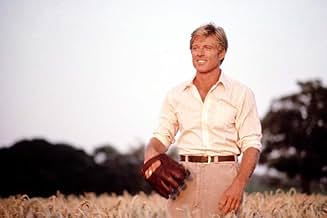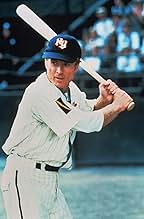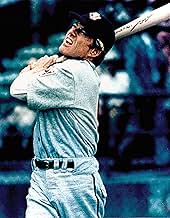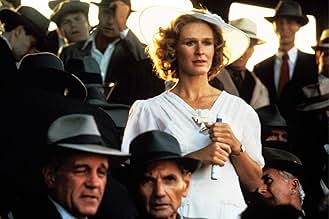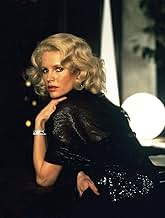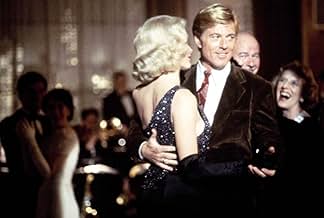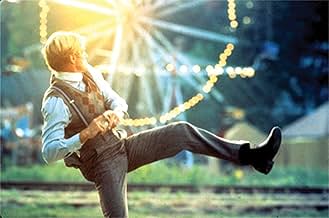A middle-aged unknown comes seemingly out of nowhere to become a legendary baseball player with almost supernatural talent.A middle-aged unknown comes seemingly out of nowhere to become a legendary baseball player with almost supernatural talent.A middle-aged unknown comes seemingly out of nowhere to become a legendary baseball player with almost supernatural talent.
- Director
- Writers
- Stars
- Nominated for 4 Oscars
- 3 wins & 9 nominations total
- Director
- Writers
- All cast & crew
- Production, box office & more at IMDbPro
Featured reviews
This is THE classic sports-Walter Mitty-fantasy movie, with an ending that may seem corny to cynical critics or those who prefer the book, but was perfect for me and a lot of other people.
Granted, I am a little biased in my review since the movie was made in the area in which grew up. Having made many trips to the ballpark in which the movie was filmed, and to the old-fashioned soda shoppe where Robert Redford and Glenn Close re-unite, this movie was special to all of us in Western New York. It always a kick, too, (and a bit odd) to watch the final scene since the opposing pitcher is a personal friend.
I think I would have loved this movie regardless of the "home-field advantage." It's an interesting, involving story that has you really rooting for Redford's character. To have actors like Close, Robert Duvall, Richard Farnsworth, Kim Basinger, Wilfred Brimley, Darren McGavin, Barabara Hershey, Robert Prosky, Joe Don Baker and others in the "lineup" doesn't hurt, either!
The cinematography is beautiful, too. That was something I never really appreciated until after several viewings. There are some wonderfully subdued brown and golden hues in here. This is very pretty motion picture.
All the characters - the good and the bad, and there are plenty of both - are fascinating. It's also nice to see an actor in a baseball film that actually knows how to throw, hit and field a baseball. This is a great, old-fashioned storytelling.
Granted, I am a little biased in my review since the movie was made in the area in which grew up. Having made many trips to the ballpark in which the movie was filmed, and to the old-fashioned soda shoppe where Robert Redford and Glenn Close re-unite, this movie was special to all of us in Western New York. It always a kick, too, (and a bit odd) to watch the final scene since the opposing pitcher is a personal friend.
I think I would have loved this movie regardless of the "home-field advantage." It's an interesting, involving story that has you really rooting for Redford's character. To have actors like Close, Robert Duvall, Richard Farnsworth, Kim Basinger, Wilfred Brimley, Darren McGavin, Barabara Hershey, Robert Prosky, Joe Don Baker and others in the "lineup" doesn't hurt, either!
The cinematography is beautiful, too. That was something I never really appreciated until after several viewings. There are some wonderfully subdued brown and golden hues in here. This is very pretty motion picture.
All the characters - the good and the bad, and there are plenty of both - are fascinating. It's also nice to see an actor in a baseball film that actually knows how to throw, hit and field a baseball. This is a great, old-fashioned storytelling.
One thing I have noticed about movies with a sporting theme is how certain sports seem to lend themselves to a cinematic treatment more easily than others. I cannot, for example, think of a single memorable film about golf, tennis or even soccer, the world's most popular spectator sport, and only one ("Chariots of Fire") about athletics. On the other hand, there are a number of distinguished films about boxing, and the same is true of baseball. I think the reason is that these two sports often take on a metaphorical significance in the cinema so that the film is about a lot more than the game itself. Boxing is generally used as a metaphor for a wider struggle against the hardships of life, as in "Champion" or the recent "Million Dollar Baby". Baseball, on the other hand, has a similar meaning for Americans to that which cricket has for the English, signifying fair play, sportsmanship and the supposed virtues of the national character.
"The Natural" was one of three great baseball-themed movies made in the eighties, the others being "Eight Men Out" and "Field of Dreams". Both those films dealt with the notorious Chicago Black Sox scandal of 1919, but did so in very different ways. "Eight Men Out" is a relatively straightforward historical drama, while "Field of Dreams" is a surreal fantasy. "The Natural", which only deals with the Black Sox affair by implication, falls somewhere between those extremes.
In 1923 Roy Hobbs, a Nebraska farmer's son and an aspiring young baseball player, is shot and seriously injured by Harriet Bird, an obsessed fan. (Bernard Malamud, who wrote the novel on which the film was based, may have been inspired by the similar real-life shooting of a baseball star named Eddie Waitkus). We never really learn the motive for the crime or what Roy does in the next sixteen years, but we next hear of him in 1939 when, at the advanced age of 36, he has just been signed by the New York Knights, a major-league baseball team. (The Knights are fictitious, but the other teams mentioned in the film, such as the Chicago Cubs, the Philadelphia Phillies and the Pittsburgh Pirates, are real).
The film then follows the ups and downs of Roy's career as his "natural" talent for the game- hence the title- lifts the once-struggling Knights from the bottom of the table until they are contenders for the National League Pennant. (The unexpected success of an underdog is a frequent theme in sports films). It also follows his relationships with two women, the glamorous if oddly named Memo Paris, the beautiful niece of the Knights' elderly manager Pop Fisher, and Iris Gaines, a woman he meets when she comes to watch a Knights game. Memo is also involved with a corrupt gambler named Gus Sands who is trying to bribe some of the Knights players to "throw" crucial games as the Black Sox did in 1919. The Judge, the Knights' equally crooked majority owner, is also conspiring with Gus as part of a plot to obtain Pop Fisher's minority holding and thereby increase his control of the team. As with all good sporting dramas, this one ends on a tense note, with the Knights playing the Pirates in the match that will decide who wins the Pennant. Will Roy hit the runs that will secure victory for his team?
Although the film is considerably more "realistic" than "Field of Dreams", it does contain some mythical elements. There are a number of parallels with the Arthurian Legends. Roy, whose Christian name means "king" in Old French, plays for a team symbolically called the Knights. Pop Fisher's surname recalls the legend of the Fisher King. Perhaps the most prominent mythical element is Roy's bat, "Wonderboy", the film's equivalent of King Arthur's Excalibur. Roy carved this bat himself from a tree on his father's farm which had been struck by lightning.
Robert Redford is one of those actors (the late Charlton Heston is another) who seems fated to be remembered largely for his work in the first half of his career. Although there have been some reasonably good later performances, posterity is likely to remember him for the likes of "Butch and Sundance" or "The Sting" rather than, say, "Indecent Proposal" or "The Last Castle". "The Natural" is, in my view, perhaps his last great film. His next, "Out of Africa", is a good film, but Redford himself was badly miscast, and all the succeeding films of his which I have seen have been to some extent disappointing apart from "An Unfinished Life". Here, however, he is excellent, making Roy a modest, seemingly simple, man, who nevertheless has hidden depths. Among the supporting cast I would single out Wilford Brimley as Pop Fisher, initially sceptical of Roy's talents but who later becomes his mentor and father-figure.
Like many sports films, and nearly all the best ones, "The Natural" uses sport as a metaphor for life. Roy here becomes an all-American hero, a man who shows that it is possible to succeed both in sport and in life if natural talent is combined with decency and strength of character. It confirms my view that Barry Levinson, the maker of films like "Diner", "Tootsie", "Rain Man" and "Good Morning Vietnam", is one of Hollywood's finest directors, capable of making deeply satisfying films about the struggles and triumphs of ordinary people. 8/10.
"The Natural" was one of three great baseball-themed movies made in the eighties, the others being "Eight Men Out" and "Field of Dreams". Both those films dealt with the notorious Chicago Black Sox scandal of 1919, but did so in very different ways. "Eight Men Out" is a relatively straightforward historical drama, while "Field of Dreams" is a surreal fantasy. "The Natural", which only deals with the Black Sox affair by implication, falls somewhere between those extremes.
In 1923 Roy Hobbs, a Nebraska farmer's son and an aspiring young baseball player, is shot and seriously injured by Harriet Bird, an obsessed fan. (Bernard Malamud, who wrote the novel on which the film was based, may have been inspired by the similar real-life shooting of a baseball star named Eddie Waitkus). We never really learn the motive for the crime or what Roy does in the next sixteen years, but we next hear of him in 1939 when, at the advanced age of 36, he has just been signed by the New York Knights, a major-league baseball team. (The Knights are fictitious, but the other teams mentioned in the film, such as the Chicago Cubs, the Philadelphia Phillies and the Pittsburgh Pirates, are real).
The film then follows the ups and downs of Roy's career as his "natural" talent for the game- hence the title- lifts the once-struggling Knights from the bottom of the table until they are contenders for the National League Pennant. (The unexpected success of an underdog is a frequent theme in sports films). It also follows his relationships with two women, the glamorous if oddly named Memo Paris, the beautiful niece of the Knights' elderly manager Pop Fisher, and Iris Gaines, a woman he meets when she comes to watch a Knights game. Memo is also involved with a corrupt gambler named Gus Sands who is trying to bribe some of the Knights players to "throw" crucial games as the Black Sox did in 1919. The Judge, the Knights' equally crooked majority owner, is also conspiring with Gus as part of a plot to obtain Pop Fisher's minority holding and thereby increase his control of the team. As with all good sporting dramas, this one ends on a tense note, with the Knights playing the Pirates in the match that will decide who wins the Pennant. Will Roy hit the runs that will secure victory for his team?
Although the film is considerably more "realistic" than "Field of Dreams", it does contain some mythical elements. There are a number of parallels with the Arthurian Legends. Roy, whose Christian name means "king" in Old French, plays for a team symbolically called the Knights. Pop Fisher's surname recalls the legend of the Fisher King. Perhaps the most prominent mythical element is Roy's bat, "Wonderboy", the film's equivalent of King Arthur's Excalibur. Roy carved this bat himself from a tree on his father's farm which had been struck by lightning.
Robert Redford is one of those actors (the late Charlton Heston is another) who seems fated to be remembered largely for his work in the first half of his career. Although there have been some reasonably good later performances, posterity is likely to remember him for the likes of "Butch and Sundance" or "The Sting" rather than, say, "Indecent Proposal" or "The Last Castle". "The Natural" is, in my view, perhaps his last great film. His next, "Out of Africa", is a good film, but Redford himself was badly miscast, and all the succeeding films of his which I have seen have been to some extent disappointing apart from "An Unfinished Life". Here, however, he is excellent, making Roy a modest, seemingly simple, man, who nevertheless has hidden depths. Among the supporting cast I would single out Wilford Brimley as Pop Fisher, initially sceptical of Roy's talents but who later becomes his mentor and father-figure.
Like many sports films, and nearly all the best ones, "The Natural" uses sport as a metaphor for life. Roy here becomes an all-American hero, a man who shows that it is possible to succeed both in sport and in life if natural talent is combined with decency and strength of character. It confirms my view that Barry Levinson, the maker of films like "Diner", "Tootsie", "Rain Man" and "Good Morning Vietnam", is one of Hollywood's finest directors, capable of making deeply satisfying films about the struggles and triumphs of ordinary people. 8/10.
I really enjoyed watching this movie. It seems like the very embodiment of the Hollywood cliche - a noble hero overcoming difficulty to achieve his dream...but somehow, The Natural manages to pull it off in a very un-glamorized way. Take the hero - he's 35 years old! It just seems refreshing not to always have a dashing young fellow of twenty as the main character. And then - an ulcerated stomach? What kind of an obstacle is that? Not a Hollywood one, I'll tell you that. This hero is actually believable - and Robert Redford plays him handsomely. He makes Roy Hobbs a real person, and a gentleman. I recommend The Natural for any Robert Redford fan, baseball fan - and anyone who just wants to see a neat, entertaining movie with a main character you can really root for.
My son and I have watched this movie twice together. I can't think of any other movie we have watched twice--together. I'm 60 and my son is 26. There is the element of magic, of fairy-tale, of other-worldliness; there is the element of the naturalness, the character of Robert Redford; there is the element of baseball, the great sport-love of millions of boys in North America--and me back in the 1950s when I was growing up and dreamed of going to the majors; there's a touch of the sexual with Kim Basinger and Barbara Hershey----one could go on listing the pluses that this movie brings to the viewers. But I think what makes the movie in the end is the magic of Roy Hobbs as he hits a baseball further and harder than anyone ever has or(probably) ever will. Hobbs is the quintessence of the baseball hero and for sports lovers that's their religion. Hobbs is like Jesus come down to earth in the form of a baseball player, yet with sins of omission and commission. So, he's human and a superhero all at once.
I can only say that I wish I had seen this movie at the theater. I own the video and watch the movie at least twice a year. I cannot imagine anyone but Redford playing Roy Hobbs. The background music is superb. Several years ago I took my family to Cooperstown,NY to visit the Baseball Hall of Fame. The main musical theme was playing as part of a baseball video.
Although the climax of the movie was excellent, I think the scene in Chicago where Glenn Close stood up and Hobbs hit the home run that broke the tower clock was definitely my favorite.
Whenever I feel a little depressed, I know it's time to pop the video in the vcr.
Although the climax of the movie was excellent, I think the scene in Chicago where Glenn Close stood up and Hobbs hit the home run that broke the tower clock was definitely my favorite.
Whenever I feel a little depressed, I know it's time to pop the video in the vcr.
Did you know
- TriviaThe bat that bat boy Bobby Savoy gives Roy is called the "Savoy Special". The Savoy Special was a brand of beer in the 1930s, and was made by the United States Brewing Company. This bat is now in the collection at the National Baseball Hall of Fame and Museum in Cooperstown, New York, displayed along with Roy Hobb's jacket in an exhibit titled "Baseball and the Movies".
- GoofsIn the game where Hobbs breaks the Wrigley Field clock, his homer ends the game, as everyone in the stands begins to leave and Hobbs gets mobbed by the press. But since the Knights were the visitors, the Cubs get to bat last.
The movie depicts the 1939 season. Prior to the 1950 season the home team had the option to bat first or last so it was possible for the visiting team to bat in the bottom of an inning.
- Quotes
Iris Gaines: You know, I believe we have two lives.
Roy Hobbs: How... what do you mean?
Iris Gaines: The life we learn with and the life we live with after that.
- Alternate versionsThere is an edited version which was released in several European countries (e.g. United Kingdom, West Germany). This version edits many dialogue and playing scenes to tighten up the pacing. It runs approx. 14 minutes shorter than the US theatrical version.
- ConnectionsFeatured in At the Movies: Indiana Jones and the Temple of Doom/The Natural (1984)
- SoundtracksThe Star Spangled Banner
Lyrics by Francis Scott Key
Music by John Stafford Smith
Performed by Kate Smith
Courtesy of RCA Records
Details
- Release date
- Country of origin
- Language
- Also known as
- El mejor
- Filming locations
- All-High Stadium - 50 Mercer Avenue, Buffalo, New York, USA(Wrigley Field scenes; Roy and Iris walking outside a brick building)
- Production companies
- See more company credits at IMDbPro
Box office
- Budget
- $28,000,000 (estimated)
- Gross US & Canada
- $47,951,979
- Opening weekend US & Canada
- $5,088,381
- May 13, 1984
- Gross worldwide
- $47,951,979
- Runtime
- 2h 18m(138 min)
- Color
- Sound mix
- Aspect ratio
- 1.85 : 1
Contribute to this page
Suggest an edit or add missing content




